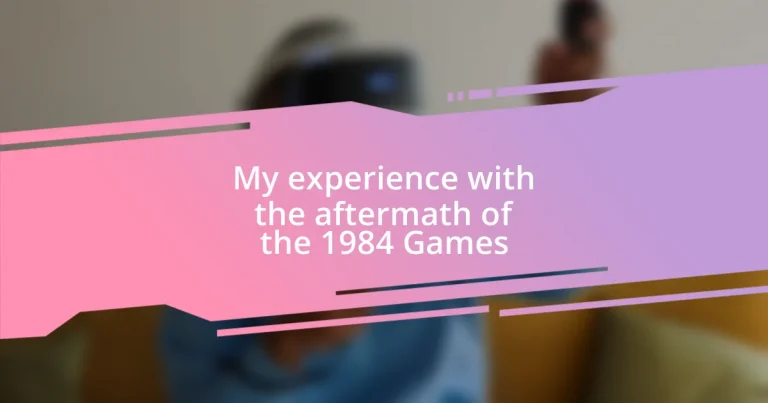Key takeaways:
- The 1984 Games significantly transformed Los Angeles’ economy, enhancing tourism and creating local job opportunities through new infrastructure and business growth.
- Community engagement was vital, fostering a collective spirit that inspired local youth and strengthened neighborhood bonds through shared experiences and initiatives.
- Lessons from the Games emphasize the importance of community involvement, adaptability for post-event use, and a commitment to sustainability in planning future large-scale events.
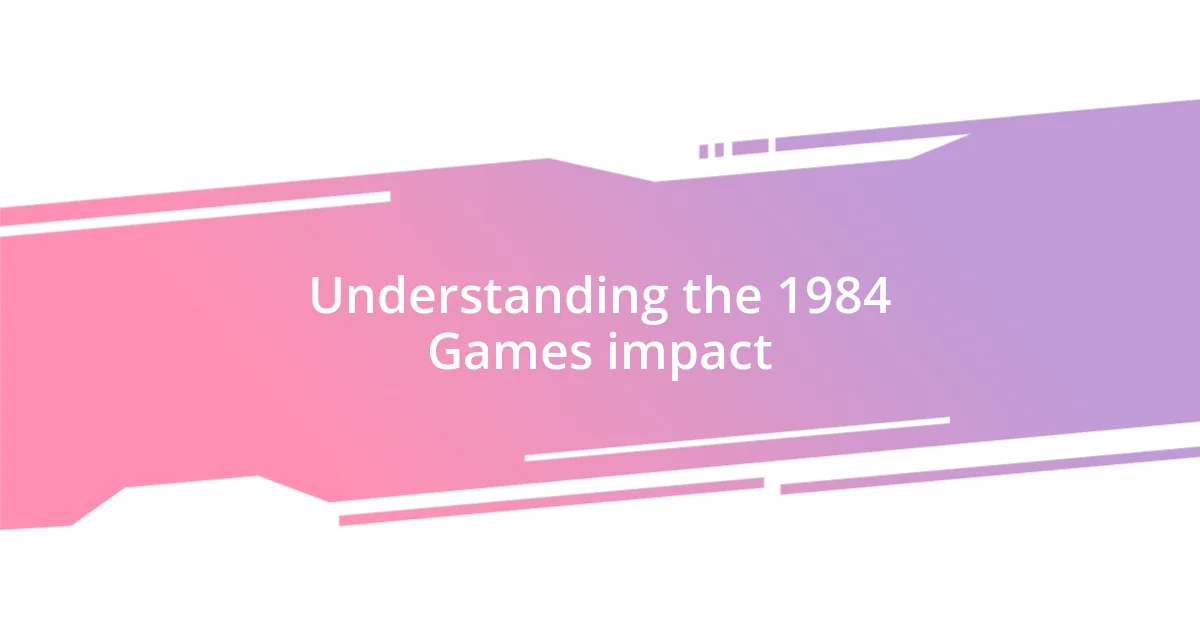
Understanding the 1984 Games impact
The 1984 Games marked a turning point, not just for Los Angeles but for the entire landscape of modern sports. I remember the buzz in the air; it was as if the city had transformed overnight into a beacon of hope. Have you ever experienced a moment where everything felt connected, like the community was woven together by a common thread? That’s how the anticipation felt back then.
The economic impact was profound, reshaping the city’s infrastructure and tourism in ways that still resonate today. I recall my friends and I marveling at the new facilities that sprouted up seemingly overnight, each one a symbol of progress. Did you ever think about how a global event could bring so much opportunity? It made me realize the power of such gatherings to change lives, both on and off the field.
Beyond economics, the 1984 Games fostered a renewed sense of pride and identity in L.A. The celebrations felt personal; they were a reflection of our resilience and unity. I still remember the joy on my neighbors’ faces as they came together to watch the events, cheering not just for athletes, but for our city. Isn’t it fascinating how something like a sporting event can stir such deep emotional connections and collective memories?

My initial reactions and feelings
The atmosphere leading up to the 1984 Games was electric. I was just a teenager back then, and the excitement was palpable; it felt like my entire city was holding its breath in anticipation. I can still vividly recall the day the torch relay passed through my neighborhood. As I watched runners with the Olympic flame, a sense of pride washed over me. It was as if we were part of something larger than ourselves.
In the days following the Games, my feelings oscillated between elation and nostalgia. I remember chatting with my friends about the unforgettable moments we witnessed, like the triumph of American gymnast Mary Lou Retton. Her performance didn’t just win gold; it ignited a spirit of hope for our generation. Have you ever felt a rush of inspiration that pushed you to pursue your dreams? That’s exactly what her victory did for me.
Reflecting on those times, I also grappled with the realization of how life would continue to change post-Games. While part of me longed for the magic to last, another piece understood that we had to carry that energy forward. The newfound unity in the community lingered, despite a distant yearning for those euphoric days. I’ve often wondered how many others felt the same blend of joy and sorrow as we transitioned back to everyday life after such an extraordinary event.
| Emotion | Experience |
|---|---|
| Pride | Watching the torch relay in my neighborhood |
| Inspiration | Mary Lou Retton’s gold medal win |
| Nostalgia | Conversations about memorable moments with friends |
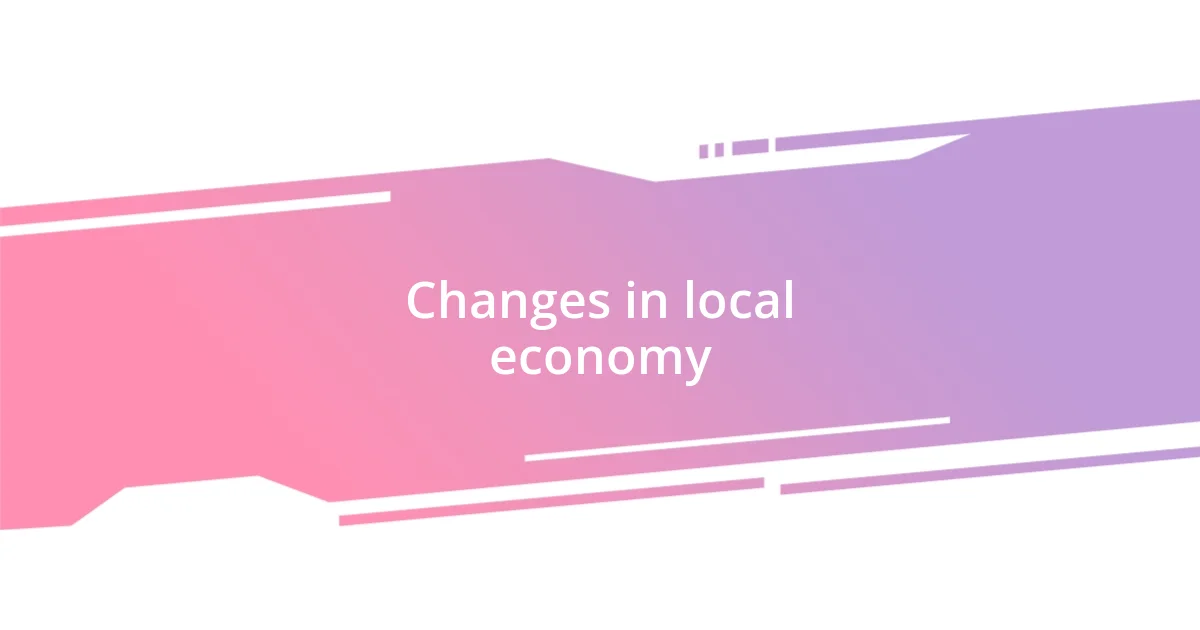
Changes in local economy
The aftermath of the 1984 Games brought significant shifts to the local economy, transforming Los Angeles into a thriving hub for business and tourism. I remember feeling the excitement as new hotels popped up and small businesses flourished, eager to cater to the influx of visitors. It was remarkable to witness how an event could breathe new life into a city, creating opportunities for entrepreneurs and workers alike.
- Increased tourism led to a surge in local job creation, from hospitality to retail.
- New infrastructure developments, like better transportation systems, enhanced accessibility to the city.
- Local businesses benefited from the international exposure during the Games, boosting their profiles.
In my own experience, I often frequented local cafés and shops that had never looked more vibrant. Some of my favorite hangouts expanded their menus, introducing Olympic-themed specialities. It was delightful to feel the pulse of the city beating stronger, knowing that something as grand as the Olympics could foster such entrepreneurial spirit. I couldn’t help but admire how community pride was manifested in even the smallest enterprises, as each shop and café displayed its Olympic memorabilia with gusto.
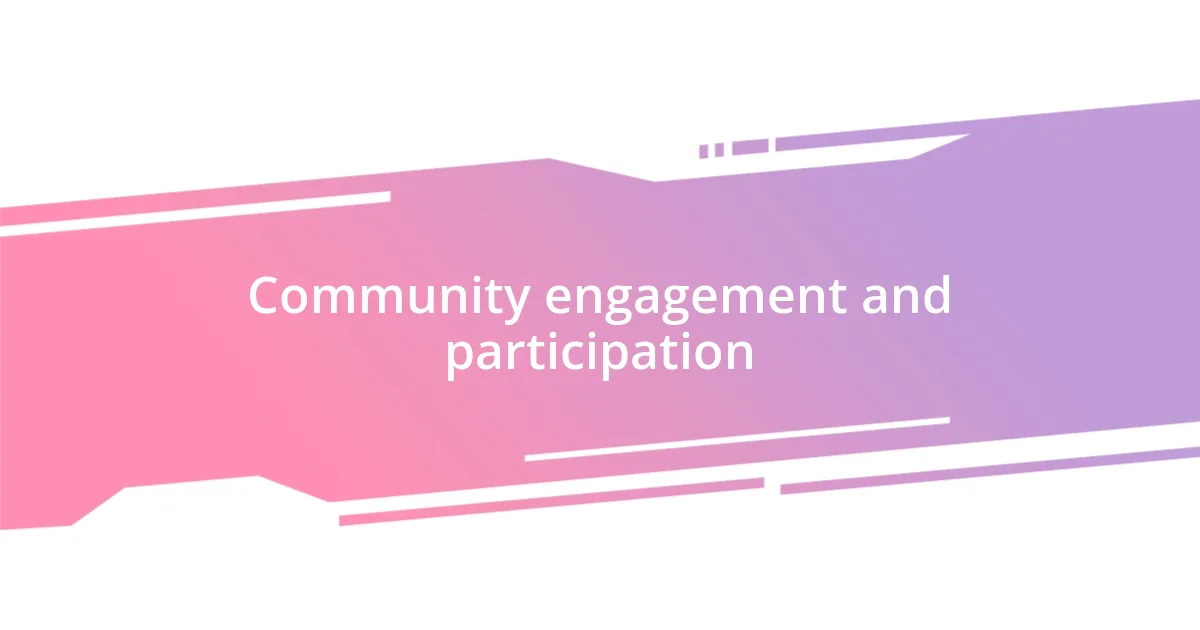
Community engagement and participation
Community engagement was a significant aspect of the 1984 Games that left a lasting impression on me. The enthusiasm was infectious; clubs, schools, and local organizations rallied together, organizing viewing parties and fundraisers that celebrated our athletes. I remember volunteering at a neighborhood event where we decorated the streets in honor of the Games. As we painted banners, I felt a deep connection to my neighbors, united by our collective pride and excitement. Have you ever participated in something that made you feel like part of a larger family? That’s how it felt.
As the Games concluded, it was fascinating to see how the community fostered initiatives to keep the spirit alive. Local youth programs saw a surge in participation, with many inspired by the athletes. I distinctly recall watching kids in my neighborhood trying gymnastics and running sprints, their faces beaming with enthusiasm. They weren’t just mimicking what they saw on TV; they were dreaming, envisioning their own futures as athletes. It’s heartwarming to think about how one event can ignite such dreams in young hearts.
In reflecting on this sense of participation, I can’t help but feel how important it is for communities to harness that energy in the long term. After all, engagement doesn’t stop after the last medal is awarded; it continues in the relationships we build and the initiatives we support. I often wonder how many friendships formed during those vibrant post-Games gatherings still thrive today. While the Olympics may have been a fleeting moment, the bonds created in our shared experiences have the power to last a lifetime.
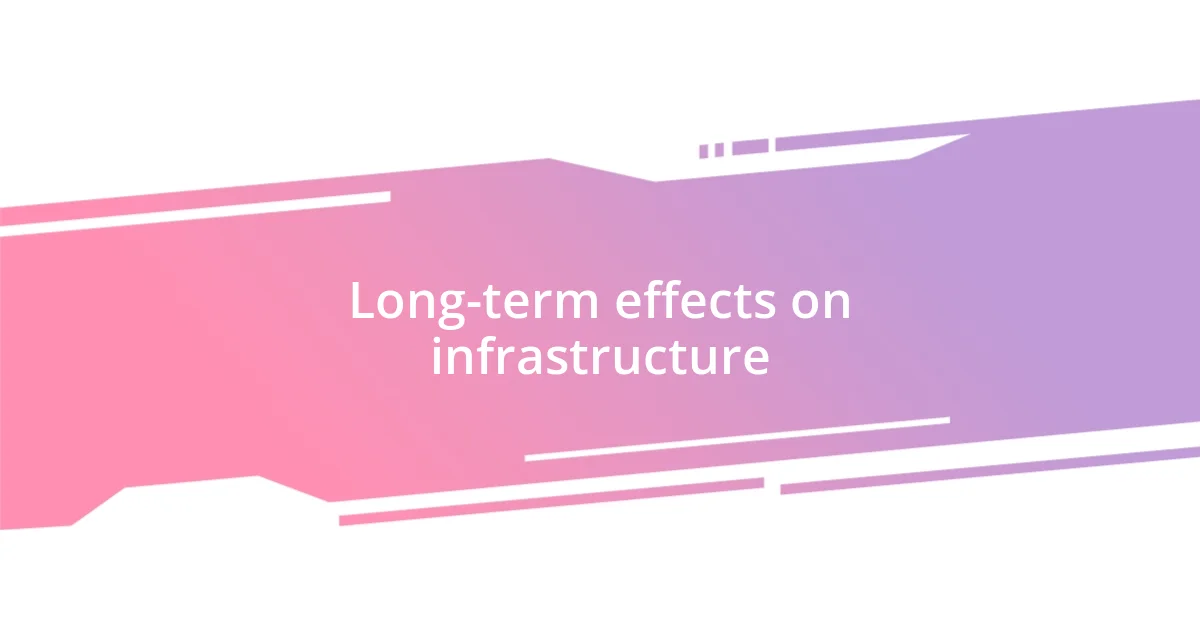
Long-term effects on infrastructure
The long-term effects on infrastructure following the 1984 Games were profound. I remember watching the construction of new highways and public transport systems that significantly improved mobility around Los Angeles. These enhancements transformed how we navigated the city, making it easier for residents and tourists alike to access various neighborhoods and attractions.
With the Olympic venues remaining after the event, I often reflected on how these facilities were adapted for community use. For instance, a local swimming pool originally built for the Games became a beloved gathering spot for families and youth programs in the years that followed. Have you ever experienced a place that’s meant for one purpose but evolves to serve a community’s needs? It’s remarkable how a single event can lay the groundwork for facilities that continue to impact daily life long after the closing ceremonies.
Additionally, the emphasis on sustainable practices began to take shape during this period. I recall seeing more green spaces and parks being integrated into urban planning, enhancing the quality of life in our neighborhoods and encouraging outdoor activities. The commitment to better infrastructure fostered not just growth but also a deeper connection to the environment. It makes me think—what kind of legacy do we want future generations to inherit from monumental events like the Olympics? The improvements initiated back then have created a lasting framework for progress that still resonates today, shaping the city’s character and fostering community pride.
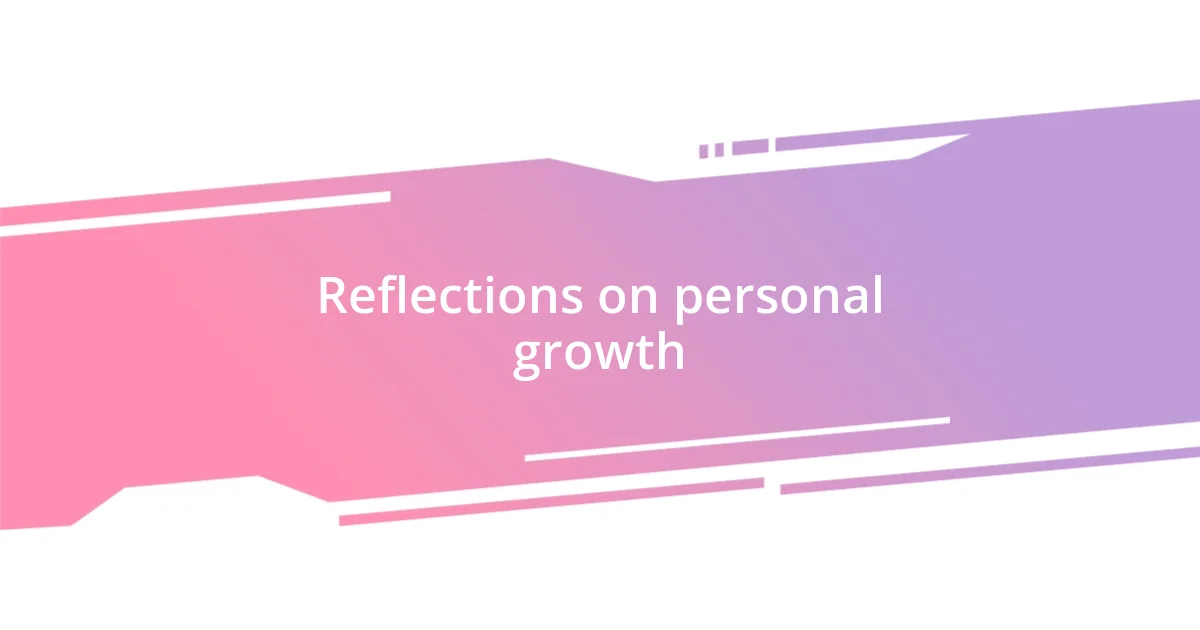
Reflections on personal growth
Reflecting on the personal growth I experienced during and after the 1984 Games brings back vivid memories. I remember standing in the middle of a bustling street fair, inspired by the vibrant atmosphere surrounding me. It was there, amidst the celebrations, that I realized the potential of my own passions. Have you ever had a moment where everything just clicked? I found my passion for event planning that day, and it became a focal point of my life.
The Games also served as a catalyst for my journey toward resilience. I faced challenges as a teenager, grappling with self-doubt and uncertainty about my future. However, witnessing athletes pour their hearts into their performances reminded me of the importance of perseverance. I often think about the unwavering spirit of those who compete at such high levels. It made me reevaluate my own approach to obstacles—learning that with each setback, there’s an opportunity for growth.
As time went on, my relationships deepened. I cherished the friendships that blossomed either from volunteering at local events or simply bonding over our shared love for sports. I’ve often contemplated how those connections shaped my social life. Have you found friends in unexpected places? I did, and those interactions played a crucial role in nurturing my sense of community and belonging. The legacy of the Games wasn’t just in the events themselves; it was in the ripple effects they created throughout our lives, fostering growth in ways I had never imagined.
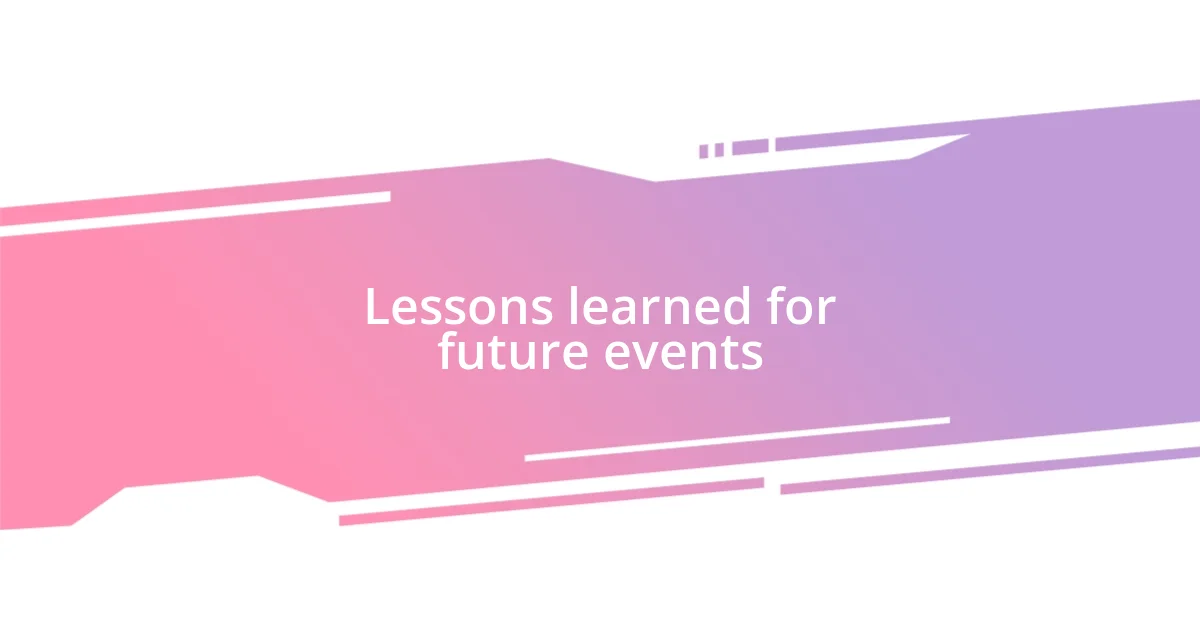
Lessons learned for future events
The aftermath of the 1984 Games taught me valuable lessons about planning for such monumental events. One key takeaway was the importance of community engagement. I vividly recall discussions held during the event’s preparations where various voices came together. It was fascinating to see how involving locals in decision-making not only garnered support but also ensured that the facilities would serve the community for years to come. Have you ever been part of a group where every opinion counts? That collective effort created a sense of ownership that truly made a difference.
Another important lesson was the significance of adaptability. I remember visiting venues that, after the Games, were transformed into spaces for concerts, community gatherings, and even farmer’s markets. This flexibility extended the impact of the Olympics beyond just a few weeks of competition. How often do we see that with events? The ability to pivot and evolve can help maintain excitement and relevance in a community, ensuring that the legacy lives on long after the final medal is awarded.
Finally, the need to prioritize sustainability became glaringly clear during this period. I recall seeing initiatives that focused on reducing waste and utilizing green technologies, which were relatively new concepts at the time. The awareness sparked by the Games offered a roadmap for future events—one that emphasizes a commitment to both the environment and the well-being of community members. Isn’t it inspiring to think about how a single moment can lead to broader awareness and action? This forward-thinking mindset can shape the planning of future events, ensuring they leave a positive impact that transcends their immediate celebration.












